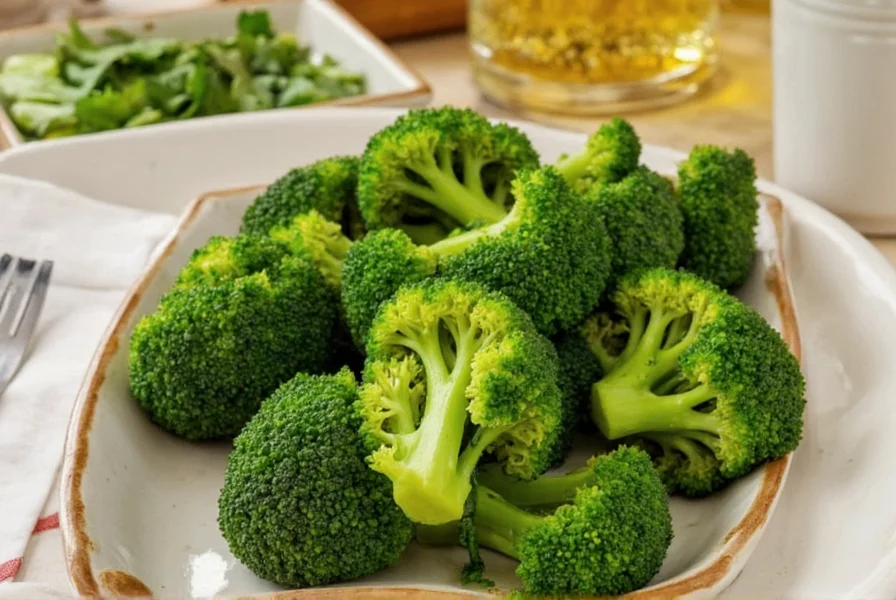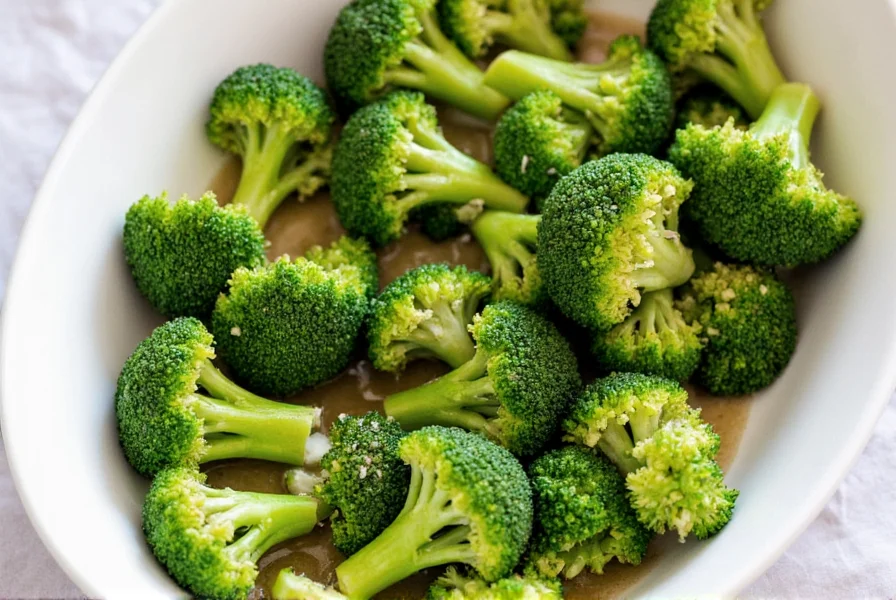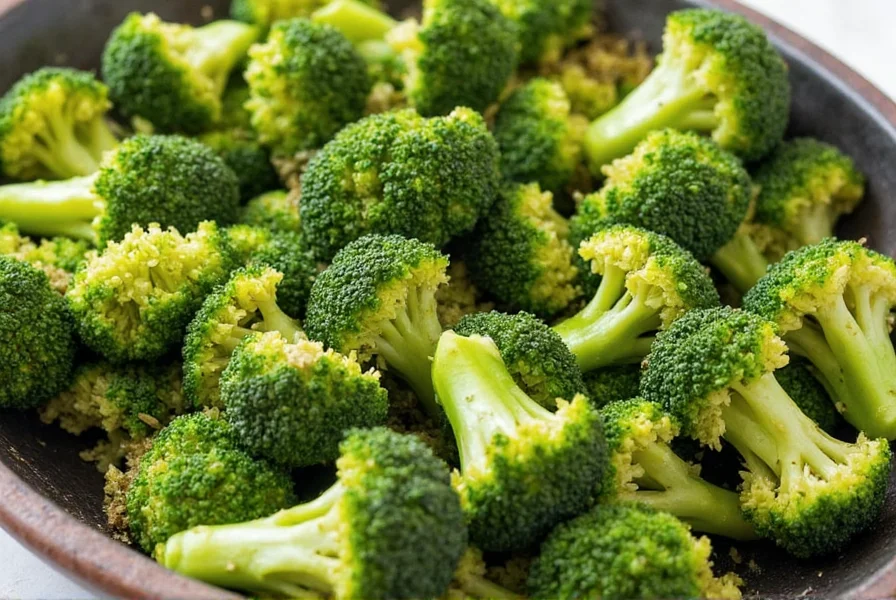Marinating broccoli transforms this humble cruciferous vegetable from bland to extraordinary with minimal effort. Unlike meats that require hours of marination, broccoli's delicate structure responds best to shorter exposure times. This guide reveals science-backed techniques professional chefs use to maximize flavor while preserving the perfect crisp-tender texture you expect from properly prepared broccoli.
The Science Behind Marinating Broccoli
Understanding broccoli's cellular structure explains why marinating time matters. Broccoli contains pectin and cellulose that maintain its firmness. When exposed to acid, these compounds begin breaking down immediately. The ideal marinating window balances flavor absorption with texture preservation.
Research shows broccoli florets absorb marinade flavors most effectively between 15-30 minutes at room temperature. Beyond 45 minutes, the acid component starts degrading the vegetable's cell walls, leading to mushiness. Oil-based components penetrate more slowly but help carry fat-soluble flavor compounds into the vegetable's surface.

Essential Components of an Effective Broccoli Marinade
A balanced broccoli marinade requires four key elements working in harmony:
| Component | Purpose | Recommended Ratio | Best Options |
|---|---|---|---|
| Oil | Carries fat-soluble flavors, prevents sticking | 3 parts | Olive oil, avocado oil |
| Acid | Enhances flavor, tenderizes slightly | 1 part | Lemon juice, apple cider vinegar |
| Seasonings | Flavor foundation | To taste | Garlic, herbs, spices |
| Sweetener (optional) | Balances acidity, promotes caramelization | Small amount | Honey, maple syrup |
Step-by-Step Marinating Process
Follow these professional techniques for perfectly marinated broccoli every time:
- Prepare broccoli properly: Cut into uniform 1.5-inch florets. Include some stem pieces for variety. Rinse and thoroughly dry—wet broccoli repels marinade.
- Make balanced marinade: Whisk together 3 parts oil, 1 part acid, seasonings, and optional sweetener. Avoid oversalting initially as broccoli absorbs salt quickly.
- Combine ingredients: Place broccoli in non-reactive container (glass or ceramic). Pour marinade over, ensuring even coverage. Gently toss to coat all surfaces.
- Marinate at proper temperature: Leave at room temperature for 15-30 minutes for cooking applications. Refrigerate for raw applications (maximum 1 hour).
- Pat dry before cooking: Remove excess marinade with paper towels before roasting or grilling for better browning.
Optimal Marinating Times by Cooking Method
Adjust marinating duration based on your intended cooking method:
- Roasting or grilling: 20-30 minutes at room temperature. This provides flavor penetration while maintaining structure for high-heat cooking.
- Stir-frying: 15 minutes maximum. Quick cooking methods require less marination time.
- Raw applications (salads): 30-60 minutes refrigerated. Longer than other methods but still limited to prevent sogginess.
- Blanching followed by marinating: Marinate for 10-15 minutes after blanching to refresh flavor without further texture breakdown.
Three Proven Marinade Recipes
Lemon-Garlic Parmesan Marinade
This versatile marinade works beautifully for roasted broccoli. Combine 3 tablespoons olive oil, 1 tablespoon lemon juice, 2 minced garlic cloves, 1 teaspoon dried oregano, 2 tablespoons grated Parmesan, salt, and pepper. Marinate 25 minutes before roasting at 425°F for 20 minutes.
Asian Sesame-Ginger Marinade
Perfect for stir-fries or grilling. Whisk 3 tablespoons avocado oil, 1 tablespoon rice vinegar, 1 tablespoon soy sauce, 1 teaspoon sesame oil, 1 tablespoon grated ginger, and 1 teaspoon honey. Marinate 20 minutes before high-heat cooking.
Mediterranean Herb Marinade
Ideal for raw applications or light cooking. Mix 3 tablespoons extra virgin olive oil, 1 tablespoon red wine vinegar, 1 teaspoon Dijon mustard, 1 tablespoon chopped fresh herbs (rosemary, thyme, parsley), and salt to taste. Marinate 45 minutes for salads or 25 minutes before roasting.

Avoiding Common Marinating Mistakes
Even experienced cooks make these broccoli marinating errors:
- Over-marinating: Broccoli becomes waterlogged and loses structure. Never exceed 1 hour, even for raw applications.
- Using highly acidic marinades: Vinegar-based marinades over 25% acid content break down broccoli too quickly. Dilute strong acids.
- Marinating at incorrect temperature: Room temperature works best for cooking applications; refrigerate only for raw consumption.
- Not drying before cooking: Excess marinade causes steaming rather than browning during roasting or grilling.
- Adding salt too early: Salt draws out moisture. Add salt in the last 10 minutes of marinating or just before cooking.
Storage and Usage Tips
Properly marinated broccoli keeps refrigerated for 1-2 days in an airtight container. For meal prep, marinate without acid component, then add acid just before cooking to maintain texture. Marinated broccoli works exceptionally well in:
- Grain bowls and salads
- As a side dish with proteins
- Wrapped in flatbreads or sandwiches
- As pizza topping before baking
- Blended into pasta dishes
Frequently Asked Questions
Can you marinate broccoli overnight?
No, marinating broccoli overnight damages its cellular structure, resulting in mushy, waterlogged texture. The maximum recommended marinating time is 1 hour, even for raw applications. For meal prep, store broccoli and marinade separately, combining no more than 1 hour before serving.
What's the best oil for marinating broccoli?
Extra virgin olive oil works best for most applications due to its flavor profile and medium smoke point. For high-heat cooking like grilling, use avocado oil which has a higher smoke point (520°F). Avoid strongly flavored oils like sesame oil as the primary oil—use them as accent oils instead.
Should I blanch broccoli before marinating?
Blanching before marinating works well for certain applications. Briefly blanch (90 seconds in boiling water, then ice bath) when you want deeper flavor penetration for cold salads. For roasting or grilling, skip blanching as it introduces excess moisture that prevents proper browning. Always dry thoroughly after blanching before adding marinade.
Why does my marinated broccoli turn mushy?
Broccoli turns mushy when marinated too long or with overly acidic marinades. The acid breaks down pectin in broccoli's cell walls. Limit marinating time to 30 minutes for cooked applications and 60 minutes maximum for raw. Use a 3:1 oil-to-acid ratio and avoid strong vinegars like white distilled vinegar which break down broccoli faster than milder acids like lemon juice.
Can I reuse broccoli marinade as a sauce?
You can reuse marinade that hasn't contacted raw broccoli, but never reuse marinade that's touched raw vegetables without boiling it first. If using the marinade as a sauce, bring it to a rolling boil for at least 2 minutes to eliminate any potential bacteria before serving. For best results, reserve half the marinade before adding to broccoli for use as finishing sauce.











 浙公网安备
33010002000092号
浙公网安备
33010002000092号 浙B2-20120091-4
浙B2-20120091-4